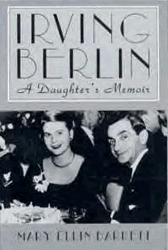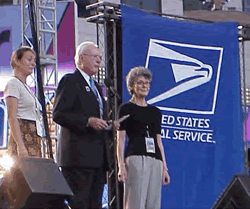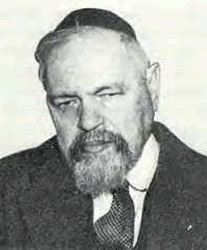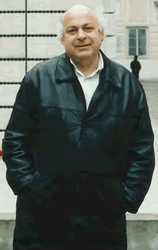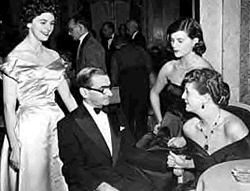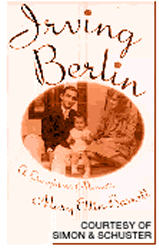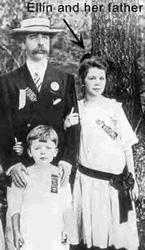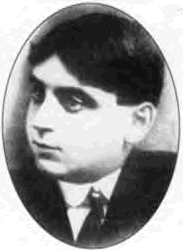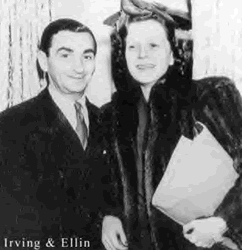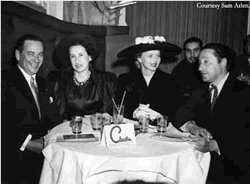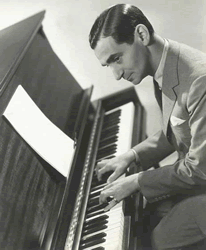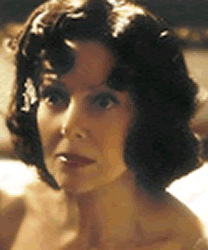#berl-3:
Prof. Bar-Ilan is a renowned
scientist on antiquity at the Bar Ilan University.
PLecture by Prof. Meir Bar-Ilan: "Jewish Religion and Medicine
in Antiquity"
Where?
Institute of Judaism (University of Vienna), 1090 Vienna, Spitalgasse
2, Universitycampus, Hof 7.3. There is also an easy access through Garnisongasse,
from there it is the second yard. Prof. Bar-Ilan is a renowned scientist
on antiquity at the Bar Ilan University. Dont miss this lecture! In
English language. Â Â
We care for you! Contact us!E-Mail: hadassah-austria@mcnon.com
March 20, 2001, 20:30 pmEvening with Prof. Galili-Weinstub
Where?
Schreiberhaus in Neustift am Walde, Rathstraße 54Meeting
with Prof. Dr. Esti Galili-Weinstub, head of the child and adolescent
psychiatry at the Hadassah hospitals at Mount Scopus and Ein Karem in
Jerusalem. Prof. Galili-Weinstub's project is the psychological treatment
of children with cancer and their families. Hadassah Austria sponsors
this project and is particularly happy to host Prof. Galili-Weinstub
in Vienna.
March 5, 2001, 19:00 pmLecture by Prof. Penchas: "Hadassah - a
Bridge to Peace"
Prof. Dr. Shmuel Penchas, former Director General of Hadassah
hospitals in Jerusalem: "Hadassah - a bridge to peace.
About the possible impossibility of cooperation between Jews, Christians
and Moslems." Altes Rathaus, Wipplingerstraße 8, 1010
Wien, Festsaal
February 25, 2001, 16:00 pmVenetian Carneval -
Photo Impressions by Dr. Zvi Stein
Some of the best impressions of Dr. Stein, an ophthalmologist,
are shown and sold on this specific afternoon. The money is meant to
go to Hadassah. A buffet, warm hospitality and all the Hadassah volonteers
welcome you.
January 18, 2001, 16:.30 pmGuided Tour through
the Archives of the Austrian Radio and Television
With Dr. Peter Dusek, Head of the Archives of ORF
ORF center KÃ1ž4niglberg
The archives of the ORF will be shown to the public during a guided
tour. If time allows, we try to fulfill special wishes to see specific
material. Only for a small number of visitors!!!! Donations for Hadassah
ATS 200,-Pleas call, or fax, or mail:
Tel. (+43 1) 4405549
Fax: (+43 1) 44055494
Email: hadassah-austria@mcnon.com December 5, 19:00Â
pmLecture by Dr. Attila Dunky
Dr. Atttila Dunky: Zacharias Wertheim, a Jewish Doctor in the "Biedermeier"
Institute of Judaistic, lecture hall 1, University Campus, old AKH,
yard 7.3.
October 26,  8:00 am to 20:00 pmTrip to the Jewish
Parts of Steyr
Organized by the Austro-Israel Society.
Reservation.: (+43 1) 405 66 83
October 22, Â 16:00Â pm Theater Afternoon
"A murder at the Wailing Wall? Why?" by Gerald Szyszkowitz
with Michaela Ehrenstein. Music by and with Peter Wehle.
Tickets: ATS 200,- Reservation: Tel.: (+43 1) 4405549 Â
Freie BÃ1ž4hne Wieden, Wiedener Hauptstr. 60b
If you have any questions and suggestion concerning Hadassah Austria,
don‘t hesitate to contact us:
Rabbi Meir Berlin (Bar Ilan) 1880- 1949
In order to be able to finance our numerous ps in our work. You are
also welcome to give a donation in any amount possible for you
rof.Prof. Bar-Ilan is a renowned scientist on antiquity at the Bar Ilan
University Bar-Ilan is a renowned scientist on antiquity at the Bar
Ilan University.
Rabbi Meir Berlin (Bar Ilan) 1880- 1949
for information about him go to http://faculty.biu.ac.il/~barilm/
www.rnh.com/news/fall94/ issue.html
www.rnh.com/news/fall94/ issue.html
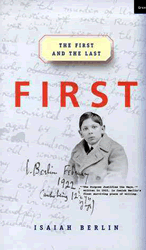
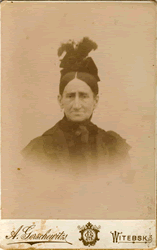
#berl-13:
"Isaiah
Berlin, 88, Philosopher and Historian of Ideas"
By Marilyn Berger
#berl-14:
Henna, wife of Rabbi Berlin 1901 submitted by her great great grandson; Vitaly Greyserman
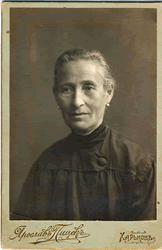
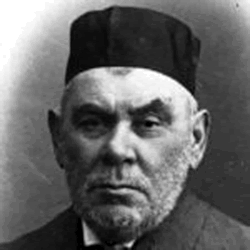
#berl-15:
Esther Berkovna Berlin (1864-1951) lived in Vitebsk from 1880-1917 and Kharkov since1918, was buried in Moscow and was the daughter of a famous rabbi. 1916
Her great grandson; Vitaly Greyserman
--My name is Vitaly Greyserman. I was born 1949 in Leningrad. Since 1990 I live in Haifa. My family tree -
https://www.myheritage.com/site-73621291/greiserman. On the maternal line - my mother, her mother, her mother - ie. my great-grandmother - nee Esther Berkovna Berlin (1864-1951) lived in Vitebsk from 1880-1917 and Kharkov since1918, was buried in Moscow and was the daughter of a famous rabbi. It is also known that there were 5 brothers Berlin and all of them were rabbis from the very famous rabbinical family Berlin. There are her photo and a photo of her mother 1823-1905 the wife of Rabbi Berlin too in Vitebsk. Unfortunately the names are not known. It is also known that in Palestine in 1914 there were no relatives named Berlin.
The stories of my grandmother also met the name Epstein.
If you know something or you are thinking about my ancestors - please write greis@netvision.net.il / greis57@gmal.com
Many thanks, Vitaly Greiserman
#berl-16:
Rav Baruch HaLevi Epstein
Also Known As:
"Rav Boruch HaLeivi Epstein the Torah Temima"
Birthdate:
1860
Death:
1941 murdered by the Nazis
Pinsk, Brest Region, Belarus
Immediate Family:
Son of Yechiel Michel HaLevi Epstein "Aruch Hashulchan" and Michlah Epstein
Husband of Wife of R' Baruch HaLevi Epstein
Brother of Batya Miriam (Mirel) Berlin; Jacon Epstein; Meir Berlin; Brina Walbrinska andDaughter of YM Epstein Shachor - Wahrhaftig
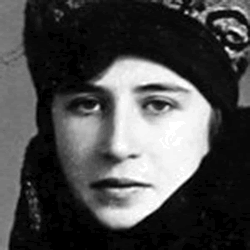
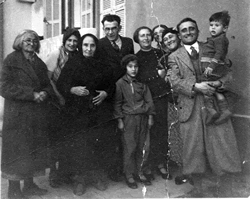
#berl-17:
Nina Nekhama Gornitzky (Berlin)
Birth:
June 10, 1892
Daugavpils, Latvia
Death:
1980
Tel Aviv-Yafo, Israel
Immediate Family:
Daughter of Yerukham Ber Berlin and Sarah Berlin
Wife of Israel Gornitzky
Mother of Yeruham Gornitzky; Uriel Gurney and Raphael Gorney
Sister of Leah Bar-Ilan; Zippora (Tzila) Lul?va; Shoshana Frumkin and Shmuel Yosef Berlin
#berl-18:
Heshel Shlomo Frumkin, Nina Nekhama Gornitzky, Sarah Berlin, Zippora (Tzila) Lul?va, Shoshana Frumkin, Uri Marom, Leah Bar-Ilan, Tzvia Shamir, Shmuel Yosef Berlin
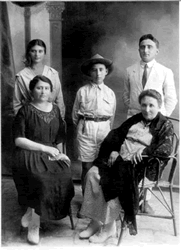
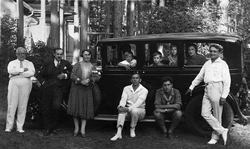
#berl-19:
Zippora (Tzila) Lul?va, Sarah Berlin, Schmuel Lulav, Shmuel Yosef Berlin, Shoshana
#berl-20:
Shmuel Yosef Berlin, Raphael Gorney , Israel Gornitzky, Nina Nekhama Gornitzky, Menachem Mendel Lulov, Yeruham Gornitzky, Zippora (Tzila) Lul?va, Schmuel Lulav, Uriel Gurney
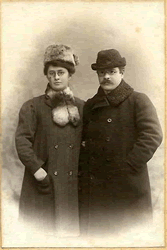
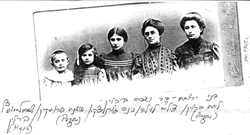
#berl-21:
Zipora Tzila nee Berlin and Menachem Mendel Lulav
#berl-22:
The Berlins of Latvia siblings:
Shmuel Yosef Berlin, Zippora (Tzila) Lul?va, Nina Nekhama Gornitzky, Leah Bar-Ilan, Shoshana Frumkin
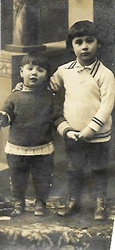
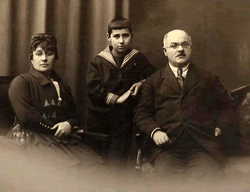
#berl-23:
Mordekhai Lulov, Schmuel Lulav Riga
#berl-24:
Menachem Mendel Lulav, Schmuel Lulav, Zippora (Tzila) nee Berlin Riga
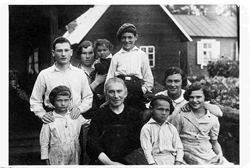
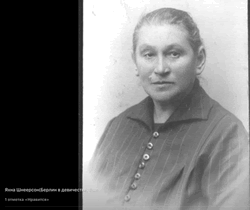
#berl-25:
Yakhna Moiseevna Schneerson, Mania Meierovna Schneerson, Movsha Israel Meierovich Schneerson, Dveira Meierovna Davidson, Sara Meierovna Schneerson
#berl-26:
Yakhna Moiseevna Schneerson (Berlin)
Gender:
Female
Birth:
1860
Vitebsk, Belarus
Death:
before December 05, 1941
Daugavpils, Latvia (killed in ghetto)
Immediate Family:
Daughter of Mosh? Zalmanovich Berlin and Dvora Berlin
Wife of R' Mikhel Shmuel Schneerson, of Griva
Mother of Meier Schneerson; Salman Schneerson; Leyba Schneerson; Tzetziliya (Tzilya) Mikhaylovna Schneerson and Boris (Benzion) Yakobinetz
Sister of Yerukham Ber Berlin; Khanna Karnibad; Musya Ganelina; Khaya Birkengeim; Mira Tulbowitsch and 2 others
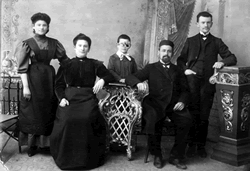
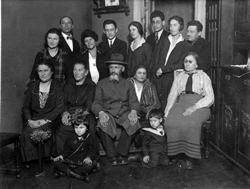
#berl-27:
Boris (Benzion) Yakobinetz, Yakhna Moiseevna Schneerson, Leyba Schneerson, Tzetziliya (Tzilya) Mikhaylovna Schneerson, R' Mikhel Shmuel Schneerson, of Griva
#berl-28:
Yakhna Moiseevna Schneerson, R' Mikhel Shmuel Schneerson, of Griva, Musya Kopelevna Davidova, Kopel Shlomovich Zhuk-Kogan, Khana Freida Benzianovna Mikhel, Olga Tzalkovna (Savelievna) Kurgatnikova, Osher Alexandrovich Kurgatnikov, Rosya (Rosa) Tzalkovna (Savelievna) Zhuk-Kogan, Abram Birkengeim, Khaya Birkengeim, Tzetziliya (Tzilya) Mikhaylovna Schneerson, Boris Osherovich Kurgatnikov, Sophia Tulbowitsch, Boris (Benzion) Yakobinetz
#berl-29:
Zalman Berlin
Birth:
estimate 1841
Immediate Family:
Father of Siskind Alexander Berlin; Binyamin Zalmanovich Berlin; Shimon Zalmanovich Berlin and Mosh? Zalmanovich Berlin
The Naziv was born to his father Yaakov Berlin in Mir, Minsk district in the month of Kislev, 5576 (1816). He was married to Rayne-Bashe, Rabbi Itsele's daughter half a year after his Bar Mitzvah. He continued to study with great diligence day and night in a small room within the Yeshiva. There were legends about his learning abilities. It was said that he was able to study 20 hours continuously day after day, in order to stay awake he held his feet in cold water. But Hanaziv himself denied the story. Years later he would say that, yes, he used to study every day, including Shabbat and holidays, but 16 hours only and that he did so for 25 years. The diligence of his youth did not leave him even in his old age. It seemed that he never slept, because in the evening, in the middle of the night and at daybreak he could always be seen entering and leaving the Yeshiva.
Hanazivs' prominent student, Rabbi Itzchak Hakohen Kook wrote about his teacher: “From his childhood it was obvious that he was born for greatness. His immense diligence, his retirement from life's joys, his immediate tendency to deepen inquiry into all of the Torah disciplines, his keeping away from distorted argumentations - “Pilpul”, and his trend to explore the Torah in order to know and to understand its truth - all that marked his way to become a Talmid Haham (wise scholar) who would illuminate the ways of the Torah and Talmud study”. .....
for the rest go to.....
http://www.jewishgen.org/yizkor/volozhin/vol112.html For family tree go to http://www.jewishgen.org/yizkor/volozhin/vol152.html
the Netziv's first wife was Reina Batya (daughter of R. Hayyim Volozhiner) She bore him three children: Hayyim, Sora Rosha, and Drayzel. The Netziv's second wife was Batya Miriam, his niece, the daughter of his sister Michlah, who was the wife of R. Yehiel Michel Ha'Levi Epstein, author of the Arukh Ha'Shulkhan. She gave birth to two sons, Jacob and Meir (Bar-Ilan). The Netziv's daughter Sora Rosha married R. Rafael Shapiro (son of R. Leibel Shapiro of Kovna). She bore him one son, and a daughter, Lifsha. When Sora Rosha died, her two small children were taken into her father's (the Netziv's) home. Her husband married her sister, Drayzel. The Netziv married his granddaughter Lifsha to R. Hayyim Soloveitchik. Because of that the Netziv sometimes called Hayyim his "grandson" and at times his "son-in-law." Meir Berlin, Rabban shel Yisroel (New York: Histadrut Ha'Mizrahi v'Amerika, 1943), pp. 153-155.
http://www.findarticles.com/cf_dls/m0411/3_51/97722699/p10/article.jhtml?term=
Natali Zvi Yehuda (son of Yaakov) Berlin (1816- 1893) first married Reina Batia, daughter of Chaim Volozhin. they had 3 children;
-Chaim was born in 1832. Chaim married Rivka nee Zaitlin
- Sara Rasha married Rabbi Raafael Shapira. Children; Yitzhak and Lipsha.
-Dreyzel ;after the Death of her sister ;Sara Rasha dreyzel married Rabbi Raafael Shapira they had six children; Mirel (married Yisrael Rif), Arye, Levi, Israel Isar, Yaakov and Yitzhak
Naftali Zvi Yehuda Berlin (1816- 1893) had two children with Batia Miryam nee Epstein; Meir and Yaakov Berlin.
Children of Meir Berlin and Bilah nee Rabinovitz;
1. Yehudit. She married Shaul Liberman c 1932 Shaul Liberman was born in Motel in 1898 and died in 1983 (his first wife was the daughter of the Rabbi of Minsk; Eliezer Rabinovitz.
2. Shulamit. Shulamit married Avraham Helkin. They had two children; Miryam (Hoch, mother of Adina, Eitan and Sharon) and Hillel (married Marsha nee Bender and had daughters; Talia and Michal.
3. Tuvia was born in Berlin in 1912 and died in Israel in 1979. In 1937 he married Tmima Rivkov and they had four children;-Naftali Zvi Yehuda married Minda nee Kosovsky in 1965 and had four children( Yechiel Mical, Shaul, Rachel Kofman and Tuvia Shlomo)
-Naama Bilah married Israel David lazar in 1967 and had four children (Avigail, Yael Pnina Volfish, Menachem Mendel and Tuvia shaanan)
-Micha married Izabel Alexander in 1979 and had five children (Yakov Shmuel, Yair, Shaul, Eitai, Eliav)-Meir married Miryam Shtinmatz in 1975 and had five children (Shlomo Gilad, Tuvia, Tzafrir, Shilo, Yarden)
Children of Yaakov Berlin and Chaia nee machover;
1. Tova married Yosef Pepish and had Yuval and Nitza
2. Michal
for more information and pictures go to the site of Meir Bar Ilan...
ftp://barilm:Search2@popeye.cc.biu.ac.il/home/tl/barilm/public_html/famINDEX.html
Rabbi Naftali Tzvi Yehudah Berlin (The Netziv)
(1817-1893) The Netziv was Rosh Yeshiva of the famed Volozhin Yeshiva for almost 40 Years until it was closed by the Russian government in 1892. Founded by R. Chaim of Volozhin, the Yeshivah flourished, increasing from 100 to 400 students. As a young man the Netziv was undistinguished, but by virtue of his extraordinary diligence grew to become one of the greatest scholars and leaders of his time. The prevalent method of Talmudic study was that of deep analysis of the "sugya" (topic) at hand. The Netziv’s approach was to immerse himself in all the relevant passages from the entire Tannaitic literature, always striving to go back to the earliest sources. Similarly, he paid special attention to the Gaonic literature and the earliest Rishonim, who were closer to the Talmudic period. He believed only in this manner could the text being studied be properly understood. His approach was strongly encouraged by R. Dovid Luria..... for the rest go to;
http://www.ou.org/about/judaism/rabbis/netziv.htm
Rabbi Baruch Halevi Epstein, the Author of Torah Temimah, Recalls His Illustrious Uncle, Rabbi Naftali Zvi Yehudah Berlin, and the Panorama of his LifeVolozhin. The Netziv (Rabbi Naftali Tzvi Yehudah Berlin). These are the names of greatness, nostalgia, brilliance; of a world that is gone but whose rays still illuminate and inspire the world of Torah. In this remarkable book, we read about the great and beloved Netziv as he was perceived by his nephew, the author of the classic Torah Temimah. The author, Rabbi Baruch HaLevi Epstein, was a student and regular houseguest of his illustrious uncle. He spent hours with the Netziv and his Rebbitzen, as well as with most other luminaries of the Lithuanian Torah world. This book, excerpted from Rabbi Epstein's multi-volume memoirs, gives us a remarkable human picture of the Netziv, who headed the world-famous yeshiva of Volozhin during its period of greatest growth and impending danger. Always the targets of the Czarist government and the notorious Jewish maskilim, Volozhin and the Netziv weathered attach after attack, until the Russian authorities forced it to close, and broke the Netziv's heart. Included is a long, warm and fascinating chapter on the author's personal experiences with Rabbi Yosaif Dov Soloveitchik, the famous Bais Halevi of Brisk, is a revealing story of the Bais Halevi's scholarship, piety and humility. This work reads like a novel. Its word-portraits are fascinating, its insights are incisive, its historical revelations are eye opening. Rarely does one read a history written by an author who was himself an acknowledged Torah authority, fully capable of understanding the greatness of his subjects. The author's own stature as a Torah scholar adds immeasurably to his writings. This is the sort of book that cannot, and should not, be put down.
by Rabbi Baruch HaLevi Epstein
Translated by Moshe Dombey
http://www.eichlers.com/899064922.html
THE REBBETZIN OF VOLOZHIN
by Rabbi Meir Berlin (son of the Netziv)
If the inner and outer life of the yeshiva students in Volozhin was different from that of the students in other yeshivas, this was due in part to the influence and dedication to Torah and kind deeds of the rebbetzin in Volozhin. The rebbetzin--or, more exactly, the wife of the chief rosh yeshiva--was not a passive figure, as is sometimes the case regarding famous woman, a decorative part of the environment, but she was active in the yeshiva leadership. In addition, she of course had not only extraordinary talent and intellect but also dedication and understanding in regard to the Torah in general and in relation to the yeshiva in particular. In addition, we need to evaluation the activities of my mother, who was indeed a rebbetzin and leader.
.... My mother of blessed memory worked in two areas: helping the yeshiva students and supporting those Volozhin residents who had anything to do with the students: that is to say, home-owners who rented out rooms to the students. As was mentioned earlier, the chalukah--the stipend that the yeshiva paid every two weeks to the yeshiva students--was given to them not directly but to their landlords (or, more frequently, to their landladies), who came and received payment every other Sunday. The money was distributed in the yeshiva office by the mashgiach. However, not all landlords or their wives came to pick up their stipend at that time. A large number received their money in larger amounts, in advance. They might need fifty or a hundred rubles, or sometimes even more, for the expense of housing the yeshiva students, and the yeshiva would make good these loans bit by bit [?].
This was no longer a regular yeshiva matter. It belonged to the area of "higher finance" operations. And all financial matters that in a broad sense involved income and expense involved the activity of my mother.
With her inborn intelligence.....for the rest go to http://www.eilatgordinlevitan.com/volozhin/vol_pages/vol_stories_rebbetzin.html
Bar-Ilan, Meir (1880-1949)
Leader of religious Zionism. Bar-Ilan was born in Volozhin, Russia, the son of Rabbi Naphtali Zevi Judah Berlin, who was the head of the famous yeshivah there. Meir later Hebraized his name. As a young man he joined the Mizrachi movement, representing it at the Seventh Zionist Congress (1905) at which, unlike the majority of Mizrachi delegates, he voted against the Uganda Scheme.
In 1911 he was appointed secretary of the world Mizrachi movement, working in Berlin; it was he who coined the Mizrachi slogan "Erez Yisrael le-am Yisrael al pi Torat Yisrael " ("The land of Israel for the people of Israel according to the Torah of Israel"). He moved to the United States in 1915, served as president of the U.S. Mizrachi, and from 1925 was a member of the Board of Directors of the Jewish National Fund.
In 1926 Bar-Ilan settled in Jerusalem where he played a leading role in the life of the Jewish community. He was a leading opponent of the Palestine partition plan in 1937, and of the British White Paper of 1939, and advocated civil disobedience and complete noncooperation of the Jewish population with the British authorities. After the establishment of the State of Israel, he organized a committee of scholars to examine the legal problems of the new state in the light of Jewish law. He also founded an institute for the publication of a new complete edition of the Talmud. Bar-Ilan University near Tel Aviv, founded by the American Mizrachi movement, is named in his honor, as is the Meir Forest in the Hebron hills, and the moshav Bet Meir near Jerusalem.
His older brother, Hayyim Berlin (1832--1912) was also a famous rabbi. He served in several Russian towns and in 1906 settled in Jerusalem where he was appointed Chief Rabbi in 1909. A yeshivah in New York is named after him.
IRVING BERLIN
Moses (Moshe) Beilin was born in Russia Jan 1846. Moses died by 1912 at 66 years of age.(14) Many of the biographies for Irving Berlin state that Moses died when Irving was eight. This is not possible as Moses appears in the 1900 census when Irving is listed as a fifteen year old. Moses' wife Lena (Leja) is listed in the 1912/1913 New York City Directory as being the widow of Moses. This is the first city directory in which she is listed in this manner. He married Lena Jarchin in prob. Russia, ca 1875.(15) Lena was born in Russia Aug 1849.(16) Lena was the daughter of Jacob Jarchin. Lena died 21 Jul 1922 in Bronx, New York, New York, at 72 years of age.(17) She resided in Bronx, New York, New York 1 Jun 1915.(
Moses Beilin and Lena Jarchin had the following children: 7 i. Sarah1 Beilin was born in Russia May 1878.(20) 8 ii. Benjamin Beilin was born in Russia Sep 1881.(21) 9 iii. Rebecka Beilin was born in Russia May 1883.(22) 10 iv. Augusta Beilin was born in Russia Apr 1885.(23) + 1 v. Irving Berlin was born 11 May 1888.
Irving Berlin was born Israel Beilin (though most biographies list it as Israel Bailin). His place of birth has also been questioned, though in all the records he filled out personally including his World War I Draft Registration card and his naturalization papers, he listed Mogilov as his place of birth. Irving died 22 Sep 1989 in New York, at 101 years of age. He married twice. He married Dorothy Goetz ca 1912. Dorothy was born in Buffalo, Erie, New York 5 Feb 1892. Dorothy died 17 Jul 1912 at 20 years of age.
He married Ellin Mackay in Manhattan, New York, New York, 4 Jan 1926.(4) Ellin was born in Brooklyn, Kings, New York 22 Mar 1903.(5) Ellin was the daughter of Clarence Mackay and Katherine Duer. Ellin died Jul 1988 in New York, at 85 years of age. Irving immigrated, 14 Sep 1893. Destination: New York City.(6) Irving Berlin, listed under his birth name of Israel Beilin, and his family arrived on the S.S. Rhynland from Antwerp, Belgium. They left to escape the pogroms inflicted on Jews in Russia at the time. He petitioned the court to become a citizen in New York, New York, New York, 15 Oct 1917. Irving Berlin and Ellin Mackay had the following children: 2 i. Mary Ellin Berlin was born 25 Nov 1926. 3 ii. Irving Berlin Jr. was born 1 Dec 1928. Irving died 25 Dec 1928 at less than one year of age. 4 iii. Linda Louise Berlin was born 21 Feb 1932. 5 iv. Elizabeth Berlin was born 16 Jun 1936.
http://www.genealogy.com/famousfolks/irvingb/d0/i0000002.htm
The first well-researched biography of Irving Berlin appeared in 1990, shortly after his death. The author, Lawrence Bergreen, a cultural historian who writes with a broadly panoramic style, gives us a good feel for the social context in which Berlin lived and worked. Bergreen finished his text before Berlin died, however, and was given access to none of the Berlin papers, and his biography suffers accordingly. Even though Bergreen's impulses are charitable, his sources often aren't, so that Berlin is characterized as rigid, insecure and unforgiving.
That image did not set well with Berlin's three daughters (who were left in charge of their father's estate), so a literary counter-attack was mounted in the 1990's. The first volley in this skirmish occurred in 1994, when Berlin's oldest daughter, Mary Ellin, published Irving Berlin: A Daughter's Memoir. This is the best book of its kind I have ever read. Typically, when children write about show business parents, their axes are thoroughly and minutely ground. But Mary Ellin Barrett is not a typical show business child. Herself a novelist, she was sixty-eight when the book was published. She writes beautifully and insightfully about both her parents. It is our first glimpse of Irving Berlin's domestic life. (Ironically, he was married for over sixty years to a successful writer, and yet hardly anything has been written about his wife or their relationship.) The most startling detail is how much time Berlin spent with his family, especially his oldest daughter, amid such a busy career. Many anecdotes make fascinating reading—Berlin’s taking his children and their schoolmates to Broadway shows, his listening to his wife read drafts of her novels, his stewing about everyday problems with the children in school. The image of Irving Berlin that emerges from this book is of a more stable, charitable and selfless man than we have before imagined. No doubt Mary Ellin is deliberately trying to soften her father's image, but, nonetheless, she does a convincing job it. I have never read a book that, by itself, does so much to alter a public impression.
A follow up to Ms. Barrett's book is Edward Jablonski's Irving Berlin: American Troubadour. Jablonski is the biggest of the big names among songwriter biographers, having written definitive biographies of George Gershwin and Harold Arlen, among numerous other books. Jablonski insists that his is not an "authorized" biography, that he didn't even interview Berlin's daughters for the book and drew his own conclusions (though he acknowledges that Ms. Barrett did read the finished manuscript and make "suggestions" and "corrections"). I don't wish to argue the point, but if this isn’t an "authorized" biography, it’s fairly close. Jablonski falls into step with Mary Ellin Barrett and continues to soften the impression left by Lawrence Bergreen.
An example of the books' differences may be helpful. In discussing the arrangements for Annie Get Your Gun, Bergreen emphasizes the negative-- Berlin's balking at the project because he couldn't have the words "IRVING BERLIN'S" above the title. Berlin ultimately backed down, but for a while it was a sticking point. Jablonski, by contrast, emphasizes the positive: Berlin's relinquishing part of his fee to Dorothy Fields so that she would make as much for the libretto as he did for the music and lyrics. Both details are apparently true, but each reveals a different side of Berlin
"Irving Berlin: A Daughter's Memoir," by his daughter Mary Ellin Barrett, reveals that his family came from Tolochin in Mogilev guberniya (province of Russian Empire). Her account coincides with a number of records from his brothers and sisters. That's why Irving's draft registration and several other records give his birthplace as Mogilev. Several of Irving's siblings were born in Tolochin but family left town after their house was burned down, possibly torched, according to Edward Jablonski (a biographer of Irving Berlin, George Gershwin and Harold Arlen) in his book "Irving Berlin: American Troubadour" Vol. 1.
But Irving, who was the youngest child in the family, is frequently said to have been born in Temun, usually identified as Tyumen in Siberia. Some family members believe his father, Moses, a cantor, had taken a temporary position there, but there are no records found. Tymen, located far from the Pale of Settlement, was not much easier a place of destination for a Jewish family than a foreign country. Being a cantor or shochet wasn't a cause for Russian administration to let his family move out of the Pale. -----The Beilins, with six children ranging in age from five to nineteen, and six pieces of luggage (including a featherbed and a samovar), boarded a train and crossed stealthily into Brody near the Austrian border of Galicia. They passed scrutiny in Brody, where Moses judiciously stated as his occupation "shomer " (i.e., "overseer" in a kosher butcher shop). From there, the train would proceed to Poland, then crossing Germany and arrive at their destination, Antwerp, Belgium to board the Rhynland for the 11-day journey to America where they arrived on September 13, 1893.
http://www.jewishgen.org/Belarus/newsletter/IrvingBerlin.htm
Born Israel Baline in Mohilev, Russia, he was the youngest child of cantor Moses Baline and his wife, Lena. The family of eight emigrated to the United States in 1893, when Israel was five, settling into New York's Lower East Side. Israel left home at 14 and began singing in Bowery saloons for spare change. In 1907, when he was working as a singing waiter in Chinatown, he earned his first songwriting credit with the words to Marie from Sunny Italy. In that year, he changed his name to Irving Berlin. By 1909, he was working as a staff lyricist on Tin Pan Alley. He soon began composing his own tunes as well as lyrics, but he never learned to play a piano properly or to read music. On a conventional piano, he used only the black keys. Throughout his career, he relied on an instrument called a transposing piano, which made it possible to change keys with the shift of a lever. After composing a tune, Berlin either sang or played it for an assistant, who would then transcribe it into musical notation. In that way, he produced a lifetime catalogue of some 1,500 songs, including such long-forgotten numbers as Father's Beard and You Cannot Make Your Shimmy Shake on Tea, along with more enduring hits. He once said that he composed "under a nervous strain," adding, "more often than otherwise, I feel as if my life depends on my accomplishing a song." With the success of "Alexander's Ragtime Band," the slightly built composer became a worldwide idol. An Italian newspaper reported that Giacomo Puccini wanted to write an opera with Berlin. In England, George Bernard Shaw announced that he had written lyrics for the composer to set to music. (Nothing came of either proposal.) In 1914, Berlin's first Broadway musical, Watch Your Step, was a major success and, by 1921, he was staging annual revues at his own Broadway theatre, the Music Box.
For most of that period of heady professional success, Berlin was a widower. His first wife, Dorothy Goetz, died of pneumonia and typhoid fever only five months after their 1912 wedding. His second marriage, in 1926--which lasted until his wife died in 1988--made the tabloids sizzle. Berlin, then 37, eloped with 22-year-old Ellin Mackay, the daughter of Long Island telegraph company magnate Clarence Mackay, a staunch Catholic who disinherited her after the wedding.
Compared with George Gershwin, Cole Porter and other accomplished composers of the time, Berlin was an unsophisticated musician. But the eloquent simplicity of his best songs went straight to the heart. By the 1930s, Berlin was writing for Hollywood as well as Broadway. He wrote the scores for three Fred Astaire and Ginger Rogers movies, including Top Hat (1933), which featured the ineffably romantic Cheek to Cheek.
The composer remained a formidable presence on Broadway with the musicals Annie Get Your Gun (1946) and Call Me Madam (1950), both of which starred Ethel Merman. But, as Bergreen writes, he had begun to lose touch with the tastes of everyday Americans. Tellingly, Berlin was so offended by Elvis Presley's 1957 rock 'n' roll version of "White Christmas" that he had his staff call radio stations across the country, urging their personnel not to play it. His last musical, Mr. President (1962), was a mammoth flop. http://www.kcmetro.cc.mo.us/pennvalley/biology/lewis/crosby/berlin.htm
Irving Berlin was born Israel Berlin in May 1888. When his father died, Berlin, just turned 13, took to the streets in various jobs, working as a busker, singing for pennies, then as a singer / waiter in a Chinatown café. In 1907 he published his first song, Marie From Sunny Italy and by 1911 he had his first major international hit, Alexander's Ragtime Band. Over the next five decades, Irving Berlin produced an outpouring of ballads, dance numbers, novelty tunes and love songs that defined American popular song for much of the century. A sampling of just some of the Irving Berlin standards included: How Deep Is the Ocean?, Blue Skies, White Christmas, Always, Anything You Can Do, I Can Do Better, There's No Business Like Show Business, Cheek To Cheek, Puttin' On The Ritz, A Pretty Girl Is Like A Melody, Heatwave, Easter Parade, and Lets Face The Music And Dance. In a class by itself is his beloved paean to his beloved country, God Bless America.
He was equally at home writing for Broadway and Hollywood. He wrote seventeen complete scores for Broadway musicals and revues, and contributed material to six more. Among the shows featuring all-Berlin scores were The Cocoanuts, As Thousands Cheer, Louisiana Purchase, Miss Liberty, Mister President, Call Me Madam and the phenomenally successful Annie Get Your Gun. Among the Hollywood movie musical classics with scores by Irving Berlin are Top Hat, Follow The Fleet, On The Avenue, Alexander's Ragtime Band, Holiday Inn, This Is The Army, Blue Skies, Easter Parade, White Christmas and There's No Business Like Show Business. His songs have provided memorable moments in dozens of other films, from The Jazz Singer to Home Alone. Among his many awards were a special Tony Award (1963) and the Academy Award for Best Song of the Year (White Christmas) in 1942.
An intuitive business man, Irving Berlin was a co-founder of ASCAP, founder of his own music publishing company, and, with producer Sam Harris, built his own Broadway Theatre, the Music Box. An unabashed patriot, his love for, and generosity to, his country is legendary. Through many of his foundations, including the God Bless America Fund and This Is The Army Inc. he donated millions of dollars in royalties to Army Emergency Relief, the Boy and Girl Scouts and other organisations.
Irving Berlin's centennial in 1988 was celebrated world-wide, culminating in an all-star tribute at Carnegie Hall featuring such varied luminaries of the musical world as Frank Sinatra, Leonard Bernstein, Isaac Stern, Natalie Cole and Willie Nelson. On September 22nd 1989, at the age of 101, Berlin died in his sleep in New York City
http://www.nodanw.com/biographies/irving_berlin.htm
Irving Berlin once said that, "a patriotic song is an emotion and you must not embarrass an audience with it, or they will hate your guts." This philosophy made him one of America's most outstanding writers of patriotic songs from World War I through World War II.
Berlin was born Israel Baline in Eastern Russia on May 11, 1888. He was one of eight children born to Leah and Moses Baline. His father was a shochet (one who kills chickens as prescribed by Jewish religious laws) who was also the cantor in the synagogue. His family moved to New York in 1893 to escape the pogroms in Russia. At the age of eight, he took to the streets of the Lower East Side of New York City to help support his mother and family after his father had died. In the early 1900s he worked as a singing waiter in many restaurants and started writing songs. His first published hit was "Marie From Sunny Italy." His successes continued through two years.
Berlin was married for only a year to Dorothy Goetz, who died from typhoid contracted while on their honeymoon in Cuba in 1913. He married Ellin Mackay in 1926. She was the daughter of Clarence Mckay, president of Postal Telegraph Company, a leading Catholic layman who opposed the wedding. The Berlins had three daughters.
In World War I, he wrote the musical Yip, Yip, Yaphank, which was produced by the men of Camp Upton. In this musical, the big hit song was "Oh, How I Hate to Get Up in the Morning," which reflected Berlin's aversion to rising early. This musical raised more than $150,000 to build a service center at Camp Upton.
http://www.us-israel.org/jsource/biography/berlin.html
1930 census;
Irving Berlin Age;41 BirthYear;1888 Russia Head White Manhattan, New York, NY married at age 36. born in Russia, came to the country in 1893. A music composer. paid $1000 rent. 54th W. (District 572 MANHATTAN BOROUGH, ASSEMBLY DIST. 15 (PART), BOUNDED BY (N) W. 56TH; (E) 5TH AVE.; (S) W. 53D; (W) 6TH AVE.) Ellin Berlin Age;26 BirthYear;1903 New York Wife Manhattan, New York, NY married at age 22.
Mary Ellin Berlin Age;3 BirthYear;1926 New York Daughter Manhattan, New York, NY
From: Jeff Miller <jrmillerwork@gmail.com>
Date: Wed, Apr 8, 2015 at 11:17 PM
Hi,
My grandfather, Samuel Rosenman (not Judge Rosenman although a relative of his) was a blind pianist who family story has it once played while Irving Berlin was a singing waiter.
How I wish I could substantiate this, especially a photograph. My grandmother was also born in Mogilev although I think there is more than one or there is both a town and a region with the same name.
Thanks for your web site and any information about my grandfather (who passed years before my birth) would be appreciated.
Regards,
Jeff Miller
